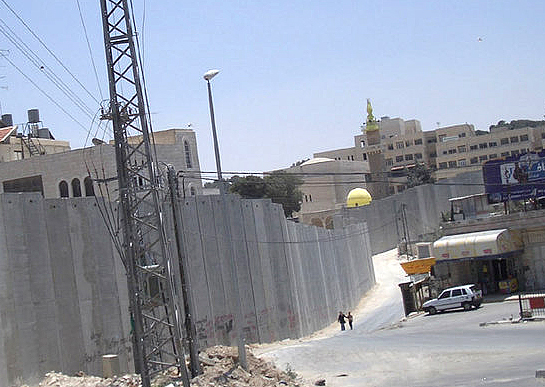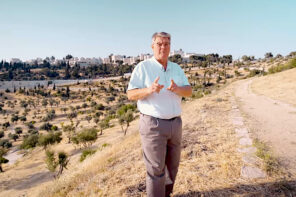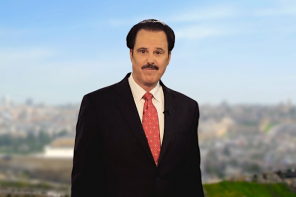On Monday, as I watched the press conference held by the family of Tariq Abu Khdeir, a 15 year-old American citizen who was brutally beaten and detained, without charge, by Israeli Border Police in East Jerusalem, I thought to myself, why doesn’t this change everything?
By everything, I mean the understanding, or at least an acknowledgement, over here, in American Jewish conversation, of the occupation. After all, can you look at Tariq Abu Khdeir’s swollen, bruised, and bloody face, or at the video of the police officers pummeling him on the ground, and not say to yourself, “is this what ‘supporting’ Israel means?”
It’s not an aberration, as Noa Yachot, an editor at 972 magazine, writes. But these abuses rarely receive media attention:
According to Defense for Children International Palestine, 214 children were detained in Israel as of May of this year. In the last 12 years, Israel has detained more than 7,000. Testimonies detail terrible abuse and torture while in Israeli detention, with few of the protections afforded children under international or Israeli law. Due process is something of a joke; Palestinians are tried in military courts, where the conviction rate is nearly 100 percent.
Many of those children are accused of stone-throwing – an allegation leveled by the police against Tariq, as well.
But despite the myriad human rights reports and their chilling descriptions, the regular injustices of the occupation rarely make mainstream headlines. Although what happened to Tariq is far from an aberration, few other Palestinian children who land, battered, in Israeli military prisons prompt calls for an investigation by the U.S. State Department and headlines in the likes of TIME Magazine, New York Times the Daily News, ABC, and many more.
Jeffrey Goldberg, who can hardly be accused of being anti-Israel, called Tariq’s beating possibly “more consequential” than the horrific execution of his cousin, Mohammed Abu Khdeir, because it was committed by “agents of the state,” and therefore evidence of a “state failure”—a failure that Goldberg was quick to point out was “not a one-off failure.”
The Mossawa Center, an advocacy group for Arab citizens of Israel, describes an uptick in “price tag attacks, unjustified police violence, and physical attacks on Arabs including women and children has led to increased anger and frustration in Arab localities,” even before the three Israeli teenagers were heinously kidnapped and murdered last month. The group has called on the international community “to put a stop to the racist violence and incitement against the Arab community in Israel and to put an end to the unjustified political arrests of youth and activists.” The Israeli human rights organization B’Tselem has collected evidence of beatings and abuse in custody (via Emily Hauser).
Violent reaction in East Jerusalem is “no surprise,” says Jo-Ann Mort, writing in Dissent:
[T]he rabid building for Jewish extremists inside of Arab neighborhoods in East Jerusalem and the lack of adequate building permits for Arab residents has angered the population. City services are scant. The atmosphere in the city fuels discontent. For example, each June on Jerusalem Day, the fiercely nationalist holiday that marks the forceful Israeli unification of Jerusalem in 1967, the police allow tens of thousands of right-wing teens and their leaders to stridently march through Arab neighborhoods with megaphones through which they shout nationalist slogans, hailing their sovereignty over the streets.
“These Jerusalemites,” Mort goes on, “have existed as ghosts to the majority of Israeli Jews and American Jews who don’t usually travel east of the holy basin in the Old City and who have no conception of Arab Israelis’ daily lives or desires.” (emphasis mine)
Tariq isn’t a ghost, though. He’s a kid from Florida who is an American citizen. Does that change anything? My Jewish teenager, your Jewish teenager would have a very different experience if he or she went to Israel to visit relatives on summer vacation. They might, in fact, not even know there was an occupation unless you told them. (Update: After I posted this, I read via the Jewish Telegraphic Agency that, apart from J Street, “among American Jewish groups, the incident hasn’t prompted much comment.”)
Sharon Abraham-Weiss, executive director of the Association for Civil Rights in Israel wrote this week, “It is clear that the current tension does not exist in a vacuum. Alongside the complex security situation, Israeli society has undergone a significant shift in recent years where it has become increasingly radical, nationalistic and antagonistic to ‘the other.'”
(Still, though, hope: Elisheva Goldberg reported hundreds of Israeli Jews paying their respects to the mourners for Mohammed Abu Khdeir.)
“The current bleak situation is strengthened,” writes Brooklyn College historian Louis Fishman, “by the fact that there is a total lack of will by the Israeli state to promote co-existence and to educate the Jewish population about the national minority within them, that they too have a legitimate right to the Land. In fact, while the current government plans at allocating money to strengthen Israeli ties with the Jewish diaspora, there are none for creating a safe haven for its non-Jewish citizens.”
Ghosts.
Israeli political commentator Dahlia Scheindlin dissects the disparate labels used to describe acts of terror committed by and upon Jews and Palestinians. “Those distinctions,” she writes, “give political insight and have legal consequences.” Using the term “Jewish extremists” to describe Mohammed Abu Khdeir’s murderers “shows that Jewish Israelis have no trouble distinguishing regular people from fanatics when they’re our own.” But, she goes on, “We don’t describe a Palestinian who kills a Jew as ‘Palestinian extremist.’ For most Israelis ‘Palestinian’ is sufficiently synonymous with extremism. Indeed, many Israelis hardly notice Palestinians except to point out acts of violence.”
These labels, in turn, create norms through which extraordinary abuses become routine:
The terrorist label is important because it means the authorities can use extraordinary legal measures rather than due process. But “extraordinary” is misleading: those actions are daily fare for the many Palestinians unlucky enough to go through the military court system. There is much talk of destroying the Jewish families’ homes – from outraged rabbis to the mother of Mohammed Abu Khdeir. That’s precisely because it’s not “extraordinary”: home demolitions and other facets of non-democratic military rule have become the norm for occupier and occupied alike.
For Jewish perpetrators, though, B’Tselem says that the Israeli military “do not do enough to prevent Israeli civilians from attacking Palestinians, their property and their lands,” and that “perpetrators are rarely tried, and many cases are not investigated at all or are closed with no operative conclusions.”
Journalist Daoud Kuttab reports on this phenomenon at Al-Monitor, including an attack in the West Bank on the Rev. Atallah Issawi and his companions, who feared for their lives. “The attack against the pastor and his companions is only one of many such incidents taking place daily involving an unarmed and rather helpless Palestinian population and settlers who are armed and ultimately protected by the Israeli military,” Kuttab writes. “The army rarely acts against the settlers, and the same frequency applies to attempts to punish or deter them.”
Would the fact of a Christian pastor being attacked — an incident which, committed anywhere else in the world, would prompt American conservatives to level claims of anti-Christian persecution — change any American minds?
Now we have Operation Protective Edge, which, Noam Sheizaf writes today, could have been avoided. Instead of claiming that Hamas rocket fire into civilian areas in Israel left it “no choice,” Sheizaf argues, “the Israeli leadership could start dealing with the root causes of those various problems, rather than waking up when everything is on fire, scoring some easy points by manipulating the public’s rage, and, once more, declaring that they left us no choice but to go to war.”
But these warnings aren’t just coming from the Israeli left; they are coming from the security establishment. At the Forward, J.J. Goldberg translates the Facebook post of the former head of Shin Bet, Israel’s security service, Yuval Diskin, who says that Israeli “illusions” fueled the current escalation:
the rapid deterioration we’re experiencing in the security situation did not come because of the vile murder of Naftali [Fraenkel], Eyal [Yifrah] and Gil-Ad [Shaer] [the three Israeli boys who were kidnapped and murdered], may their memories be blessed. The deterioration is first and foremost a result of the illusion that the government’s inaction on every front can actually freeze the situation in place, the illusion that “price tag” is simply a few slogans on the wall and not pure racism, the illusion that everything can be solved with a little more force, the illusion that the Palestinians will accept everything that’s done in the West Bank and won’t respond despite the rage and frustration and the worsening economic situation, the illusion that the international community won’t impose sanctions on us, that the Arab citizens of Israel won’t take to the streets at the end of the day because of the lack of care for their problems, and that the Israeli public will continue submissively to accept the government’s helplessness in dealing with the social gaps that its policies have created and are worsening, while corruption continues to poison everything good, and so on and so on.
Ghosts. Illusions. And so on and so on and so on.





